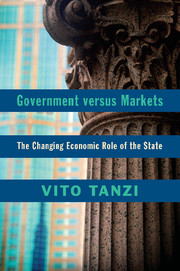Book contents
- Frontmatter
- Contents
- Preface
- PART ONE THE ECONOMIC ROLE OF THE STATE
- PART TWO HISTORICAL REVIEW
- PART THREE THEORETICAL AND ANALYTICAL ISSUES
- 7 Theories of Public-Sector Behavior
- 8 Voluntary Exchange and Public Choice Theories
- 9 The Nordic European Economic Theory of Fiscal Policy
- 10 Policy Tools and Government Roles
- PART FOUR THE OUTCOME OF STATE INTERVENTION
- PART FIVE ON THE ECONOMIC ROLE OF THE STATE IN THE FUTURE
- Notes
- Index
- References
8 - Voluntary Exchange and Public Choice Theories
Published online by Cambridge University Press: 07 October 2011
- Frontmatter
- Contents
- Preface
- PART ONE THE ECONOMIC ROLE OF THE STATE
- PART TWO HISTORICAL REVIEW
- PART THREE THEORETICAL AND ANALYTICAL ISSUES
- 7 Theories of Public-Sector Behavior
- 8 Voluntary Exchange and Public Choice Theories
- 9 The Nordic European Economic Theory of Fiscal Policy
- 10 Policy Tools and Government Roles
- PART FOUR THE OUTCOME OF STATE INTERVENTION
- PART FIVE ON THE ECONOMIC ROLE OF THE STATE IN THE FUTURE
- Notes
- Index
- References
Summary
Introduction
Part II of this book described how the economic role of the state evolved, during the 19th and the 20th centuries, from one in which “the Mafia would [have been] a more accurate characterization of the state, [to one] concerned with the “public good … a state that is self-consciously concerned with the performance of the economy is a relatively modern phenomenon … associated with the rise of ‘representative government’” (North, 1989, p. 108). With the passage of time, the redistribution of income (from the top down and horizontally, depending on the distribution of economic risks and benefits) became an important objective and, together with the stabilization of the economy, was added as a relative newcomer to the legitimate goals pursued by governments.
While political discussions of the role of the state go back to Aristotle, Plato, Socrates, Machiavelli, and various philosophers during the Enlightenment in Europe and during the creation of the United States of America, in the previous chapters we discussed how a few major economists, and especially Adam Smith, Karl Marx, and John Maynard Keynes, contributed through their writings and those of their followers to the evolution in that role, over the 19th and 20th centuries, in the economies of the world. Directly or indirectly, each of these economists had an important impact on how governments saw their function and their responsibility in the economy.
- Type
- Chapter
- Information
- Government versus MarketsThe Changing Economic Role of the State, pp. 169 - 192Publisher: Cambridge University PressPrint publication year: 2011



